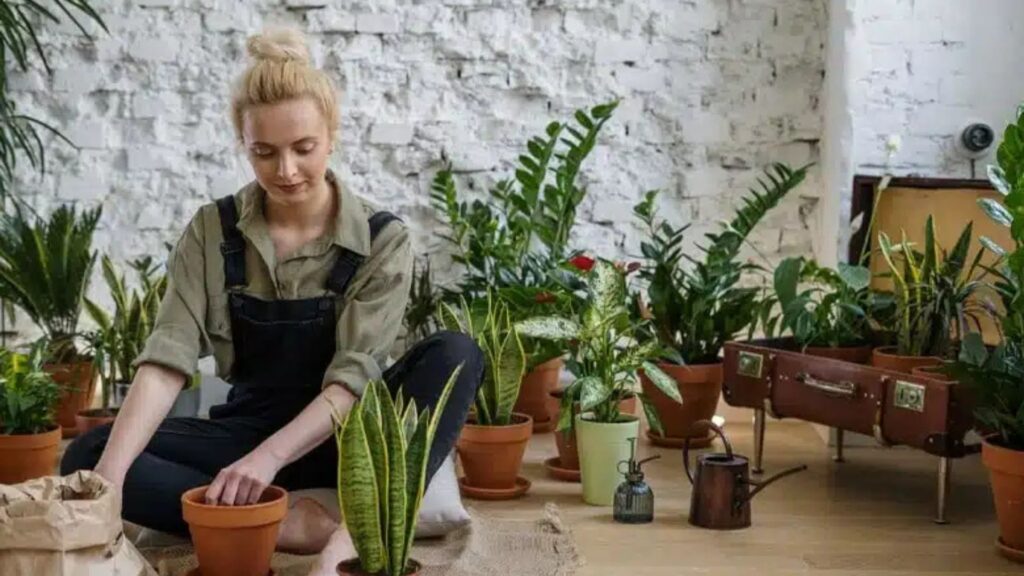In recent years, indoor plants have become more than just home décor. From office desks to apartment windowsills, houseplants are popping up everywhere. But beyond their visual appeal, a growing body of research suggests that plants may positively impact our mental well-being.
So, the question is: Do indoor plants actually make you happier? Let’s explore what science and psychology have to say.

The Connection Between Nature and the Human Mind
For centuries, humans have lived in close connection with nature. However, as urbanization has grown, our daily exposure to greenery has drastically decreased. Still, our brains retain a deep-rooted response to natural elements, including plants.
Psychologists refer to this as biophilia—the innate human tendency to seek connections with nature. Bringing plants indoors is one way we subconsciously satisfy this natural craving.
How Plants Affect Mental Health
Several scientific studies support the idea that being around plants improves psychological well-being. Here’s how:
Reduced Stress and Anxiety
One of the most well-documented effects of indoor plants is their ability to reduce stress. Studies have shown that just being in the presence of greenery can lower cortisol (the stress hormone) levels.
Example: A 2015 study published in the Journal of Physiological Anthropology found that individuals who interacted with houseplants experienced lower stress levels than those performing a similar task on a computer.
Improved Mood and Positivity
Indoor plants can boost mood and emotional well-being. Their presence has been linked to feelings of calmness, satisfaction, and happiness. This could be due to the visual stimulation of greenery, or the sense of purpose that comes with caring for a living thing.
Think of how uplifting it feels to see a bright flower bloom or a new leaf unfurl.
Enhanced Focus and Productivity
Not only can plants make you feel better, but they can also help you think better. Several studies have shown that indoor plants improve concentration, memory, and cognitive performance, particularly in workplaces and study areas.
Example: Research by the University of Exeter revealed that productivity can increase by up to 15% in offices with just a few indoor plants.
Faster Recovery and Healing
In hospitals, plants and natural views are known to support faster healing and emotional recovery. Patients with indoor plants or garden views often report less pain, lower anxiety, and a more positive outlook on their recovery.
This effect is so strong that many hospitals now include greenery or healing gardens as part of their design.
Why Caring for Plants Feels Good
The act of nurturing a plant also plays a psychological role. Caring for something creates a sense of responsibility and provides a daily routine, which is especially beneficial for people struggling with anxiety, depression, or loneliness.
Moreover, watching a plant grow and thrive due to your care gives a sense of achievement and control—two things that greatly influence happiness.
Best Indoor Plants for Mental Wellness
If you’re looking to bring happiness into your space through greenery, some plants are known to be especially calming and low-maintenance:
-
Snake Plant – Purifies air and thrives in low light
-
Peace Lily – Beautiful, air-purifying, and easy to grow
-
Lavender – Its scent is known for reducing anxiety and promoting sleep
-
Aloe Vera – Great for air quality and also useful for skin care
-
Spider Plant – Tolerant and lively, great for beginners
Choose plants that match your lifestyle and lighting conditions. The goal is to enjoy, not stress about care!
Indoor Plants in Modern Life
In an increasingly digital and isolated world, indoor plants provide a tangible, calming connection to life. Whether you’re working from home, living in a small apartment, or just seeking a way to boost your mood naturally, adding a bit of green to your environment can go a long way.
Many people report feeling more at ease, motivated, and balanced simply by spending time with or caring for their houseplants.
Conclusion
So, do indoor plants make you happier? The answer is a strong yes—supported by science, psychology, and personal experience. From reducing stress and improving mood to enhancing focus and giving a sense of purpose, indoor plants offer multiple mental health benefits.
While plants aren’t a cure-all, they are a simple, natural, and beautiful way to improve your day-to-day life. So go ahead—add some green to your home or workspace. Your mind (and maybe even your productivity) will thank you.
